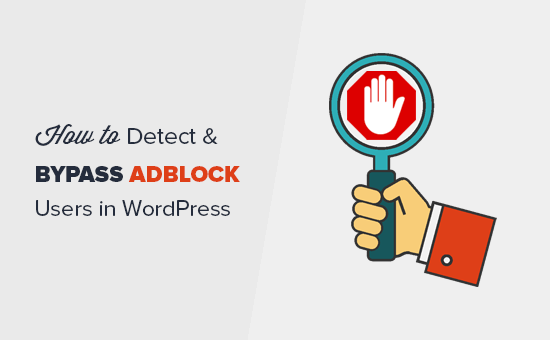Are you looking for ways to detect AdBlock users in WordPress? Many bloggers rely on ad revenues to support their website. Browser extensions like AdBlock plus can hurt your revenue potential. In this article, we will show you how to detect AdBlock users in WordPress and share ways to bypass the AdBlock software.
What is AdBlock, and How it Hurts You?
AdBlock and other ad blocking software allow users to automatically detect and block advertisement on websites.
While Adblock brings a cherished ad-free experience to users, it can hurt bloggers who rely solely on ad revenues.
Research published by PageFair shows that the total number of devices using AdBlock software grew from 142 million YoY to 615 million devices in 2016.

Mobile devices with AdBlock software increased from 145 million to 380 million.
Another research conducted by Ovum estimates that publishers will lose $32 Billion to Adblock software by the year 2020.
This is a serious problem affecting many websites particularly blogs that rely on advertisements as their primary source of revenue.
What should you do about Adblock as a publisher?
There are several measures that website owners have taken in this regard.
1. The Do-Nothing Approach
As the title says, you do nothing about the users with AdBlock. You simply learn to live with the loss of revenue for the sake of happy users.
2. Passive Approach
You can nicely ask your users to whitelist your website with a promise of quality content and non-obtrusive ads. There is no way to know how effective such an appeal would be.
Another alternative is to create a membership website with paid subscription plans. You can promote paid plans as an ad-free experience with additional content and features.
Reddit is a great example of this approach to their Gold membership plan.

3. Aggressive Approach
In this approach, you simply block the site for all users with AdBlock enabled. If they want to view your content, then they must disable AdBlock.

This kind of approach is rather aggressive, and it will turn away users from your site. PageFair’s survey shows that 77% of adblock users leave websites with adblock walls.
It’s best to use the passive approach that we mentioned above.
How to Detect AdBlock Users in WordPress
Before you can request users to whitelist and support your website, you need to be able to detect the AdBlock users. Fortunately, there are plenty of ways to do that in WordPress.
We will show you a few different methods, and you can choose the one that best suits you.
1. Detect and Target AdBlock Users with OptinMonster
OptinMonster is the best lead generation software in the market. It allows you to convert website visitors into subscribers and customers.
OptinMonster comes with a built-in feature that allows you to show option campaigns to users with ad-blocking software installed on their devices. This includes popular software like AdBlock, AdBlock Plus, and unlock Origin.
First, you will need to sign up for an OptinMonster account. You’ll need at least their Pro plan to access the AdBlock targeting.
Once you have signed up, you can head over to your WordPress site to install and activate the OptinMonster plugin.
This plugin acts as a connector between your website and OptinMonster.
Upon activation, you need to click on the OptinMonster icon in your WordPress admin bar. You’ll be asked to enter your API key. You can find this information from your account on the OptinMonster website.
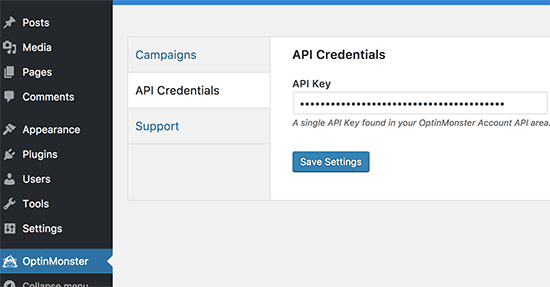
After entering your license key, click on the ‘Create new campaign’ button at the top.
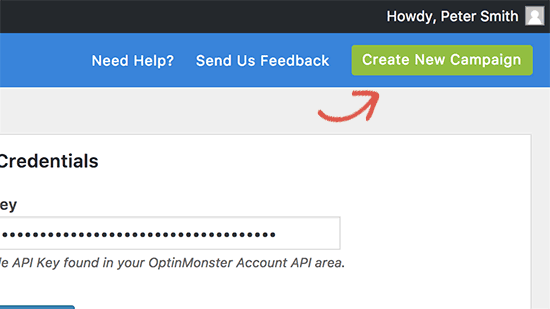
This will take you to the OptinMonster website.
First, you will need to choose a campaign type. If you want to take the passive approach, then you can use the lightbox popup campaign type. On the other hand, if you want to aggressively lockout AdBlock users, then you can use the Fullscreen campaign type.
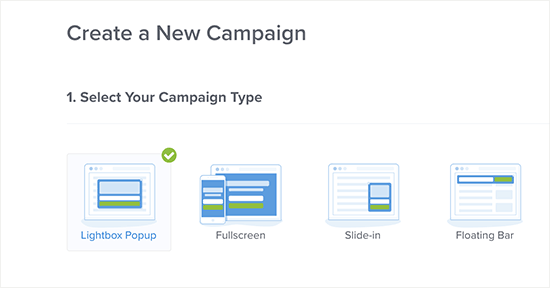
Next, you need to choose a template for your campaign. For this tutorial, we are using the ‘Target’ theme, but you can choose a different template if you want.
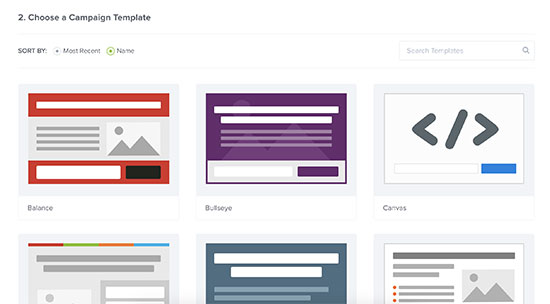
Now you will be asked to choose a title for your campaign. After that, you will be redirected to the OptinMonster’s campaign designer.
Simply click on the text in the option to edit it.
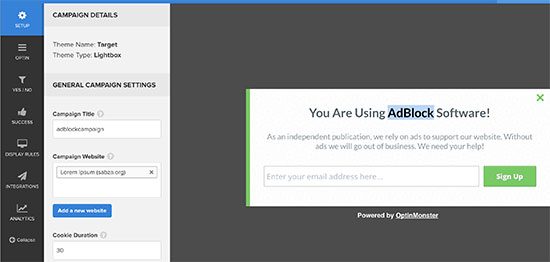
Next, you need to click on the Yes/No icon to convert this option from email subscription to a Yes/No campaign.
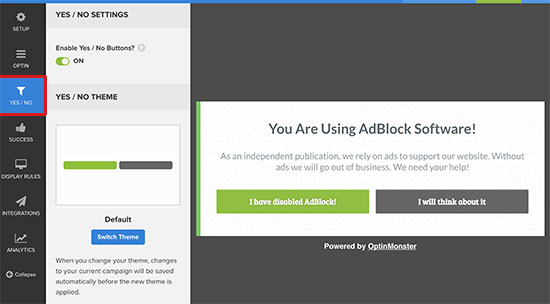
Now you can click on the yes and no buttons to edit their text. We have changed the yes button to ‘I have disabled AdBlock’ and the no button to ‘I will think about it’.
After that, you need to click on the ‘Display Rules’ tab and scroll down to ‘Visitors who are using AdBlock’ rule. You need to activate the rule and then select enabled next to ‘Show only when the visitor has adblock’ option.
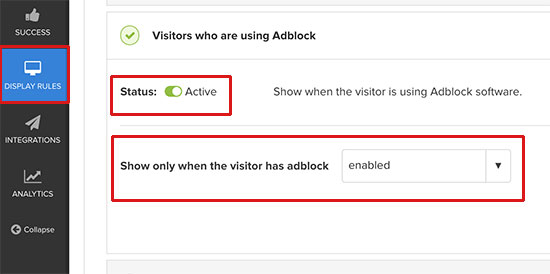
Next, you need to click on the save button to store your option and then click on the publish button to make your campaign available.
You will be asked to choose the website where you want to display the campaign.
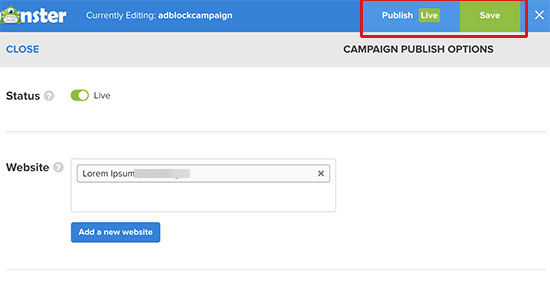
After this, you can head over to the OptinMonster settings page on your WordPress website and click on the ‘Refresh Options’ button. OptinMonster will now fetch the new option campaign you just created.
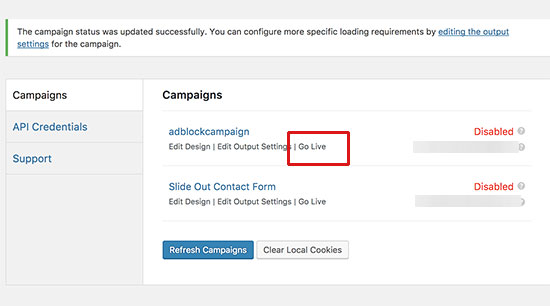
You will need to click on the ‘Go Live’ button to enable your AdBlock detection campaign go live on your website.
You can test out your campaign by installing the AdBlock extension in your browser and visiting your website. You will see a popup asking users to support your website by disabling AdBlock.
For an aggressive approach, you may want to see this guide on how to lock out AdBlock users with OptinMonster’s AdBlock targeting feature. This will allow you to hide content from users with AdBlock software installed in their browser.
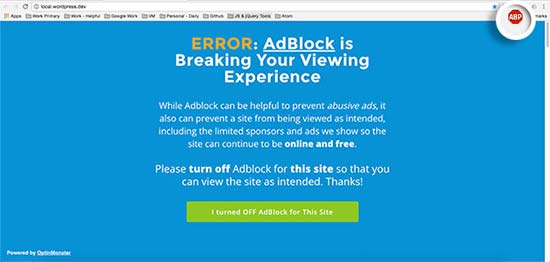
2. Target AdBlock Users with AdSanity Plugin
AdSanity is one of the best ad management plugins for WordPress. It has a paid ‘Ad Block Detection’ add-on that allows you to detect users with ad-blocking software and restricts their access to your website until they disable ad blocking.
First, you need to install and activate the AdSanity plugin. After that, you need to install and activate their Ad Block Detection add-on.
Upon activation of both plugins, you need to visit AdSanity » Settings page and click on the Add-Ons tab.
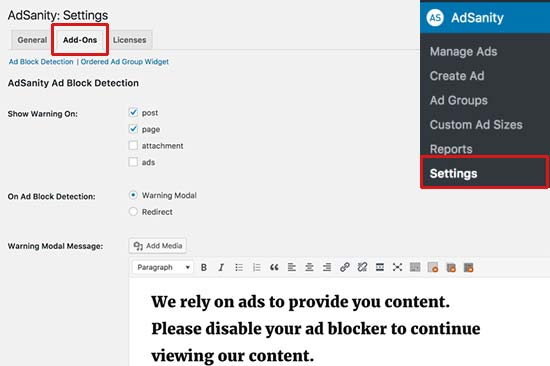
AdSanity allows you to detect AdBlock on posts and pages. You can show a warning popup to AdBlock users with your custom message, or you can redirect them to a custom page.
Both methods are aggressive and would require users to disable AdBlock to continue browsing your site.
3. Detect AdBlock Users with deAdblocker
If you are looking for a free option that allows you to detect AdBlock users, then you can try this method.
First, you will need to install and activate the deAdblocker plugin.
Upon activation, head over to Settings » deAdblocker page to configure plugin settings.
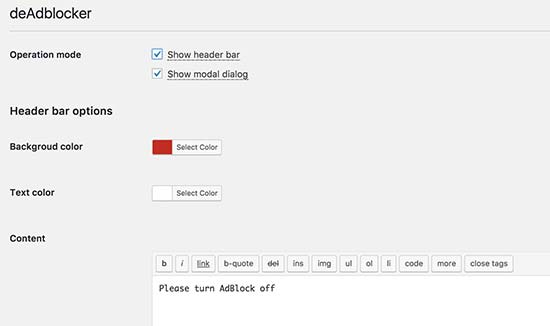
The plugin allows two methods to show a custom message to AdBlock users. You can either display a notification bar on the top of your website or show a lightbox popup.
Both options are dismissible, and users will be able to ignore the message to continue browsing your website.
Don’t forget to save your settings. You can now visit your website with AdBlock extension installed in your browser to test the plugin.
Diversify Your Revenue Streams
Publishers are finding new ways to combat ad blocking and protect their earnings. At the same time, ad blocking software is getting smarter every day.
Research shows that privacy, security, and bad user experience are the most common complaints among AdBlock users. Publishers can address these complaints by adopting different monetization methods that address those issues.
1. Affiliate marketing
Affiliate marketing is one of the most common ways to earn money from your content. You can recommend products and services to your users and earn the commission when users make a purchase using your affiliate link.
There are plenty of plugins and tools for affiliate marketers that will help you get started.
2. Selling direct ads

If you are serving ads through a third-party advertising network like Google AdSense, then you have limited control of ads, privacy, and the CPC.
Selling ads directly to advertisers allows you to ensure privacy, limit tracking, and control what you get paid.
WordPress ad management plugins like AdSanity allow you to serve your own ads as well. You can use hosted images on your own websites for ads and easily bypass most adblocking software.
Tip: Don’t wrap your ads around HTML elements with CSS classes like ads, advertisement, promo, etc. This is how AdBlocking software detects and block ads.
3. Sponsored Content
Allow advertisers to sponsor content on your website. You can write content about their product or service, and you can even include an affiliate link to get referral commission. You can also require users to pay to submit a post to your website.
4. Premium Content
Another helpful strategy used by many online publications is premium content. You can adopt a pay per view model, membership plans, or simply restrict pages to paid users.

For more ways to diversify your website’s revenue, take a look at our guide on different ways to make money online from your website.
We hope this article helped you learn how to detect and bypass AdBlock in WordPress.
